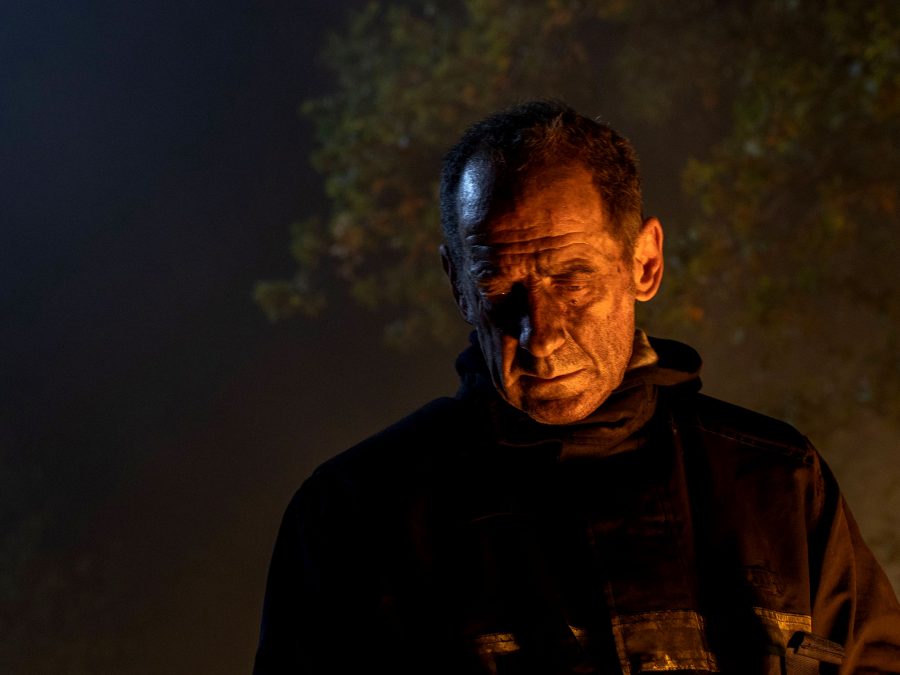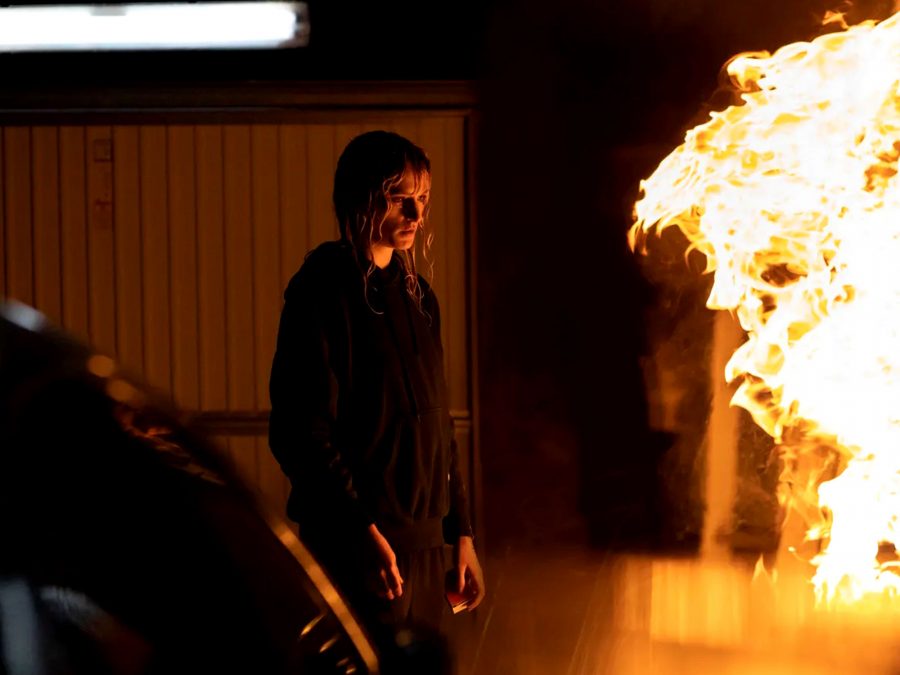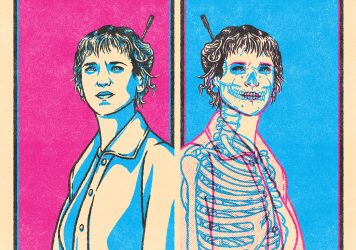All hail the new flesh in Julia Ducournau’s dreamlike fable of a fractured young dancer grappling with the fire inside her.
There is an easy way to sell any cinephile on Titane: this is a darkly funny midnight movie; an amalgamation of capital-G genre pictures; a sexy and strange romp where the structural rug pulls beg to remain unspoiled and picked apart in equal measure. None of that is wrong, exactly.
Julia Ducournau’s second feature is a total blast, silly and tight and sufficiently gnarly, with sound design that allows a beat after every crunch for the audience to gasp. What makes Ducournau’s Palme d’Or winner so special, however, is that it is never quite the movie you expect it to be. It opts, again and again, for the richer, more perverted, more beautiful path.
It does not put you at a disadvantage to know the plot of the movie going in, though it is certainly misleading. The events, as laid out on paper, propose an emotional arc that is different to what’s contained within the work proper, eschewing entirely the particularities that Ducournau’s camera brings to frame.
For now, what you need to know goes as follows: after an accident in her youth, Alexia, played by Agathe Rousselle, works as a dancer in a muscle car garage, the trauma of her childhood leaving her with a scar above her right ear and an erotic attachment to automotive machinery. Following a series of horrific events, she winds up running away and disguising herself as the long-lost son of a grieving fireman, played by Vincent Lindon.

It is impossible to undersell the technical command of form on display here. In an era of mainstream horror when ostentatious symmetrical compositions are all the rage, here is a film where the visual style is split five ways down the side, before collapsing gleefully into a base language of guts.
Titane is not a horror film, but it is unapologetically slimy, full of creative, madwoman concoctions of viscera. The violence on display is neither moralised nor strictly provocative. This is just good gore – an olive branch extended to the gross outcasts who dig it. Needless to say, the movie is cool as fuck.
Given the subject matter, 1996’s Crash is the easiest point of reference, and an early needle drop (‘Doing it to Death’ by The Kills) seems to place the film in conversation with the controversial adaptation of JG Ballard’s classic novel. Truthfully, David Cronenberg is nothing but a superficial comparison. The Canadian director’s gore is ecstatic and sensuous; Ducournau’s is pungent and rigid.
Penetrative violence comes at odd angles: down the side of a ribcage; at the hinge of a jaw; stomachs splitting perpendicular to stretch marks. Lactation turns into pus turns into oil that clots and empties alongside dense clumps of skin. The characters of Titane do not know normative intimacy, and all legibly sexual contact is met with recoil.
“Every frame is angry, fearful, fuelled by a power born from demons that even the most desecrated of bodies refuses to name.”
The opening hour is a descent into the touch-repulsed mania of a hollow soul. Moments that would play as crowd-pleasing set-pieces in the hands of a lesser director buzz with suffocating isolation. Like the best slashers, any pathologisation of the severe-bodied Alexia falls to the wayside. There is an intuitive logic to the first half of the film, where every gesture is loaded with the potential for danger, every wound becomes a retaliation. Every frame is angry, fearful, fuelled by a power born from demons that even the most desecrated of bodies refuses to name.
Ducournau is no stranger to discontent. Her debut feature, Raw, was adequately primal, but unimaginative – demarcated by a self-hating horniness whose hysteria failed to illuminate the horrors and liberties of puberty. Her fury consumed any potential emotional range or thematic complication, a choke collar tugging against potential insights on pleasure and the very French martyrdom of female sexuality.
Titane does not solve for any previous limitations of the director’s work: the biological functions of cis women still keep a stern watch over any performance of femininity, the spectres of New French Extremity and Camille Paglia offering qualifying statements on the film’s metaphors like the careless insults of a bad ex. When Alexia writhes angrily atop a Cadillac near the beginning of the film, it’s clear Ducournau is going for some hackneyed metaphor about the fetishisation of parts (vehicular, sexual), a dimension of the narrative that would be offensive if it were not so cartoonish.
The whole thing smacks of gender, so to speak. Anything directly analogous, either to the “irreversible damage” of transition so bemoaned by TERFy pundits over the past decade, or the concerns of contemporary genderqueer narratives, feels incidental. Alexia tapes her chest and stomach down at several points throughout the film, yelping in pain and writhing in agony, her body progressively deteriorating under the strain. There is no suggestion that her pain comes from her repressing her femininity, or her submission to masculinity for survival.
Ducournau’s script never questions that the main character is a cis woman – think less the befuddled framing of Brandon’s body in Boys Don’t Cry, more Viola’s playful scheming in ‘Twelfth Night’. As we culturally move away from examining transness as medicalised suffering, there has arisen a moment of reflection; it is true that the concept of dysphoria, the dissociation from one’s own body and gender, a deep discomfort with the hormones that coarse through a body like active toxins, is a universal experience shared by cis and trans folks alike.

Similarly, while there is explicitly queer sex, Ducournau does not suggest that as a salve against heteronormative structures. Much has been made of the film’s tender second half, but it is worth highlighting how thrillingly opaque the dimensions of its central relationship actually plays out. Even calling Lindon and Rousselle’s connection that of chosen family fails to encapsulate the totality of their love.
It makes the nature of queerness feel inevitable, something discovered by those even without the language for it. The perpetually submissive Lindon gives himself over completely to the film’s rhythms, every breath shaking his ligaments, the corners of his mouth aching with grief. In a standout scene, Lindon and Rousselle go on a housecall and wind up performing CPR on two people simultaneously across the room, keeping in time to a mumbled rendition of the ‘Macarena’.
What could have been a moment of comic relief becomes a starting diatribe on emotional boundaries and a new kind of closeness. Ducournau veers away from expected fixations, setting up punchlines that are instead replaced by sonnets.
For a film with so much physically grounded imagery, Titane finds itself often flirting with the metaphysical, such as a late moment in which Lindon accidentally engages in bedside self-immolation. There is a tension between what our bodies allow and what our desires crave that collapses by the film’s finale, just as Ducournau’s limited conceptions of patriarchal society collide with a radical, anthropocenic queerness.
Titane is a genuinely weird, sweet thing, even in a time where those descriptors get thrown around far too much. There has not been a more surprising motion picture in years.
Published 22 Dec 2021
Palme d’Or or not, this sounds like a try-hard edgelord provocation.
Heavy-Metal-Heart-type-beat. Exhilaratingly messy.
A film that defies emotional physics, a tender treatise on intimacies which we have yet to name.

Buckle up and say a Hail Mary as we take a peek under the hood of Julia Ducournau’s visceral Palme d’Or winner.

The French model-turned-actor on getting into character for her breakout role in Julia Ducournau’s Titane.

Our annual countdown of the year’s finest silver screen offerings. How many have you seen?